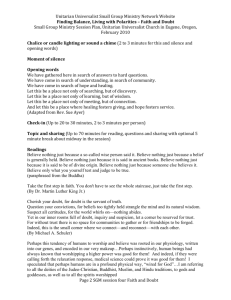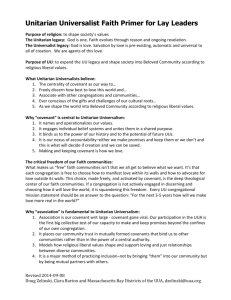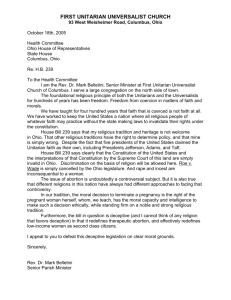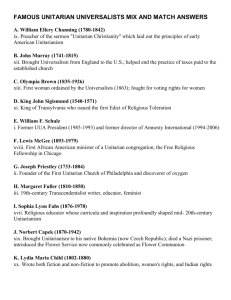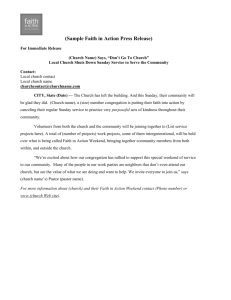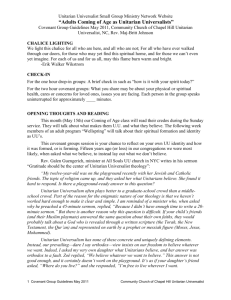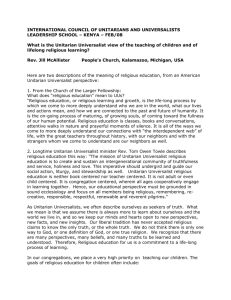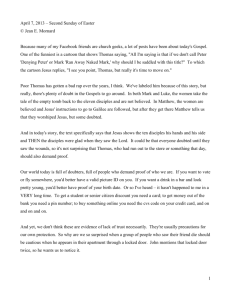A Faith Worthy of Doubt - Unitarian Church of Harrisburg
advertisement
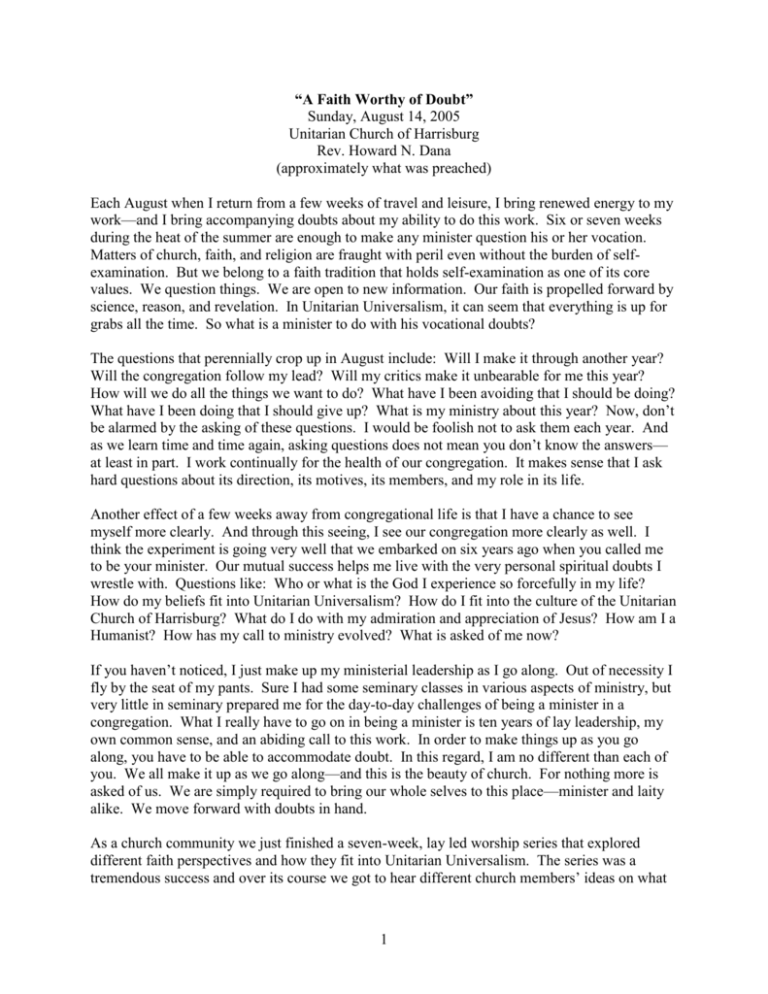
“A Faith Worthy of Doubt” Sunday, August 14, 2005 Unitarian Church of Harrisburg Rev. Howard N. Dana (approximately what was preached) Each August when I return from a few weeks of travel and leisure, I bring renewed energy to my work—and I bring accompanying doubts about my ability to do this work. Six or seven weeks during the heat of the summer are enough to make any minister question his or her vocation. Matters of church, faith, and religion are fraught with peril even without the burden of selfexamination. But we belong to a faith tradition that holds self-examination as one of its core values. We question things. We are open to new information. Our faith is propelled forward by science, reason, and revelation. In Unitarian Universalism, it can seem that everything is up for grabs all the time. So what is a minister to do with his vocational doubts? The questions that perennially crop up in August include: Will I make it through another year? Will the congregation follow my lead? Will my critics make it unbearable for me this year? How will we do all the things we want to do? What have I been avoiding that I should be doing? What have I been doing that I should give up? What is my ministry about this year? Now, don’t be alarmed by the asking of these questions. I would be foolish not to ask them each year. And as we learn time and time again, asking questions does not mean you don’t know the answers— at least in part. I work continually for the health of our congregation. It makes sense that I ask hard questions about its direction, its motives, its members, and my role in its life. Another effect of a few weeks away from congregational life is that I have a chance to see myself more clearly. And through this seeing, I see our congregation more clearly as well. I think the experiment is going very well that we embarked on six years ago when you called me to be your minister. Our mutual success helps me live with the very personal spiritual doubts I wrestle with. Questions like: Who or what is the God I experience so forcefully in my life? How do my beliefs fit into Unitarian Universalism? How do I fit into the culture of the Unitarian Church of Harrisburg? What do I do with my admiration and appreciation of Jesus? How am I a Humanist? How has my call to ministry evolved? What is asked of me now? If you haven’t noticed, I just make up my ministerial leadership as I go along. Out of necessity I fly by the seat of my pants. Sure I had some seminary classes in various aspects of ministry, but very little in seminary prepared me for the day-to-day challenges of being a minister in a congregation. What I really have to go on in being a minister is ten years of lay leadership, my own common sense, and an abiding call to this work. In order to make things up as you go along, you have to be able to accommodate doubt. In this regard, I am no different than each of you. We all make it up as we go along—and this is the beauty of church. For nothing more is asked of us. We are simply required to bring our whole selves to this place—minister and laity alike. We move forward with doubts in hand. As a church community we just finished a seven-week, lay led worship series that explored different faith perspectives and how they fit into Unitarian Universalism. The series was a tremendous success and over its course we got to hear different church members’ ideas on what 1 it means to incorporate Judaism, non-belief, Paganism, Christianity, agnosticism, Buddhism, and Humanism into Unitarian Universalism. Wow! What other kind of church would do this? What other kind of church would allow for so much theological latitude among its members? A church or synagogue might have members who think or believe differently than the official beliefs, but they are not going to be asked to speak from the pulpit about those differences. In our questioning, we turn what is normative in religious practice on its head. We approach faith much differently than most people. For us, faith is something that is enriched by doubt, not something that must be protected from doubt. S. Mark Heim writing in the Christian Century says: The great virtue of liberal Protestantism was that it submitted Christianity to tests it could fail. If Christianity cannot meet the norms of contemporary secular historical study, the rigor of current scientific explanations, or neutral comparison with other religions, liberalism was willing to render an honest verdict: Christianity must be changed. …One cannot draw interest on the bank account of some grand, meaningful narrative while remaining indifferent to whether each individual check that funds it is overdrawn against shared standards of rationality and credibility. (Christian Century, June 29, 2004, p. 30) Mark Heim puts his finger on exactly what happened to Unitarianism and then Unitarian Universalism as it grew further and further away from its Christian roots—when put to the test, for us at least, the vast majority of Christianity failed. We couldn’t buy the miracle stories. We weren’t interested in the creeds or the sacraments. And we questioned Christianity’s exclusive claims that only Jesus is Lord. Oddly, we still remain very much a part of liberal Protestantism. And even odder still, we continue to put Christianity to the test. If Unitarian Universalism has a role to play in the religious world it is precisely to see if religion can meet the norms of contemporary secular historical study, the rigor of current scientific explanations, and neutral comparisons with other religions. We still want to know if something happened, if it fits into what we know of the physical world, and if it can make room for other beliefs. No more important place is there in 21st American religion than that of the doubter—of the heretic. Robert Weston reminds us in our responsive reading: Those that would silence doubt are filled with fear; their houses are built on shifting sands. But those who fear not doubt, and know its use, are founded on rock. They shall walk in the light of growing knowledge; the work of their hands shall endure. Therefore let us not fear doubt, but let us rejoice in its help. It is to the wise as a staff to the blind; doubt is the attendant of truth. Ours is a faith worthy of doubt. We come from a long line of women and men who dared to think for themselves and to risk being branded heretics for it. Over and over again Unitarian Universalists have found themselves among the vocal minority—on issues of slavery, issues of war, women’s issues, gay and lesbian issues, and issues of civil liberties. And this is where we belong. To doubt the direction of one’s government is a noble thing. To doubt society’s need to keep some people in their place is a noble thing. To doubt the use of religion to maintain the status quo is a noble thing. These are doubts worthy of religious liberals. 2 In a letter to John Adams on July 20, 1811, Dr. Benjamin Rush, the only Universalist signer of the Declaration of Independence, wrote: Dear Old Friend—The 4th of July has been celebrated in Philadelphia in the manner I expected. The military men, and particularly one of them, ran away with all the glory of the day. Scarcely a word was said of the solicitude and labors and fears and sorrows and sleepless nights of the men who projected, proposed, defended, and subscribed to the Declaration of Independence. Do you recollect your memorable speech upon the day on which the vote was taken? Do you recollect the pensive and awful silence which pervaded the house where we were called up, one after another, to the table of the President of Congress to subscribe what was believed by many at the time to be our own death warrants? The silence and the gloom of the morning were interrupted, I well recollect, only for a moment by Colonel Harrison of Virginia, who said to Mr. Gerry at the table: “I shall have a great advantage over you, Mr. Gerry, when we are all hung for what we are now doing. From the size and weight of my body I shall die in a few minutes, but from the lightness of your body you will dance in the air an hour or two before you are dead.” This speech procured a transient smile, but it was soon succeeded by the solemnity with which the whole business was conducted. (Letters of a Nation, p. 88) Doubts about whether to sign the Declaration of Independence or not—those are doubts worth remembering. Little do we realize that when something truly matters, people’s lives can be on the line. It is one thing to question your actions or your beliefs; it is another thing entirely to act from courage in the face of those doubts. Might we, too, hold doubt and courage in balance. As soon as I get back to work each August, my attendant doubts and fears somehow just melt away. It is clear to me that I am doing what I want to be doing. I serve a church that is harmonious, prosperous, and increasingly interested in taking up a bolder mission in the world. Any professional fears I harbor evaporate when I visit one of you in the hospital, when I help dedicate one of your children, when I perform a wedding or a memorial service, and when I lead us all in worship. It is fine to doubt things. It is fine to question things. It is fine to think for ourselves. But what is better is to find the courage to move ahead amid doubts and fears. What is better is to have faith that I am enough—we are enough—and we can do what we put our minds to. A faith worthy of doubt is still a faith. It is faith that allows us to do extraordinary things. It is faith that binds us to all of creation and shows us our part in the creation. It is faith that connects us with all that is holy and sacred in life. In faith, we move forward together to minister to the world. Come, let’s go. Take one another’s hands. So be it. Amen. 3 I will be the first to say that we played our role as heretic in the 20th century very badly. More often than not Unitarianism and then Unitarian Universalism acted like a bratty religious child that took her ball and went home, leaving more mature minds to wrestle with the state of religion in the world. Too often we thought ourselves vastly intellectually superior to our Christian and Jewish brothers and sisters. Too often we allowed race and class to cloud our judgment and fuel our snobbishness. And through its exclusionary tactics, Unitarian Universalism almost killed itself in the 20th century—but not quite. We survived the incredible societal changes of the 20th century to pop up like a little loon on a vast lake, small but alive and able to swim and call out. That there are more Methodists in Central Pennsylvania than there are Unitarian Universalists in the world should tell us something. But what is a loon to do? Just as ministers doubt their abilities, churches suffer the same worries. Will we make the budget? What if no one comes to the services or the classes or the meetings we hold? How will we retain our new members? What will become of us if we can’t be all things to all people? How will we fix the parking lot? What will we do if disagreement makes people mad at each other? Can we do the things we have planned? These doubt are equal to the doubts I come back to work with each August. They are natural, but they are insignificant. They are not the right doubts to hold up. They are doubts that keep us small and insignificant rather than engaging us in the wider world. So what doubts might this congregation express that will be as a staff to the blind? Which of our doubt might be attendants of the truth? Can we see beyond our fear to ask questions of importance? What would those questions look like? Here are a few thoughts: Can we see our mission clearly enough to know what we need to do to expand Unitarian Universalism in Harrisburg? Can we imagine a new church building with room for our congregation to at least double in size? Can we call an associate minister? How soon can we make the Oliver LaGrone scholarship fund self-perpetuating? When can we add another choir? Shall we buy a different piece of property so that we can have a more visible presence? How will we double the size of our religious education program? What will we be known for among people of faith? Who shall we serve? 4
